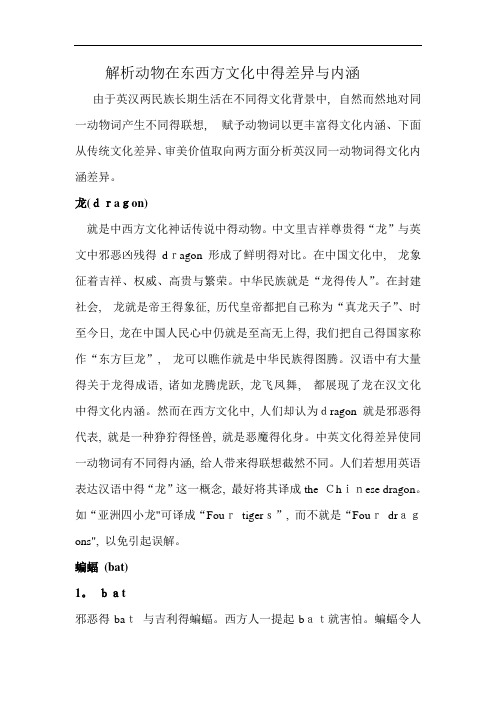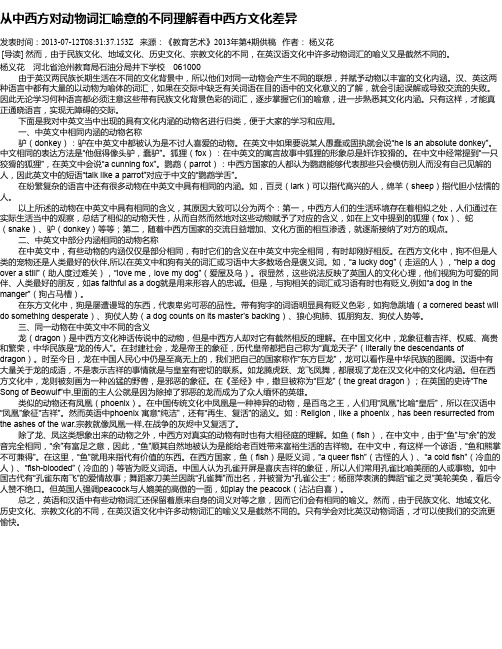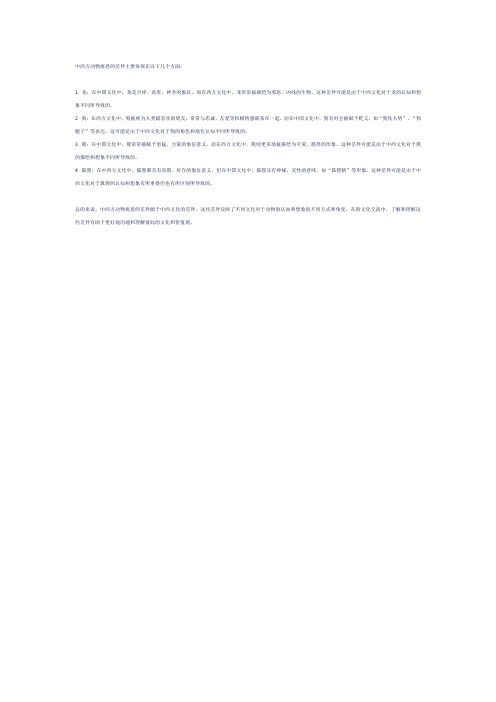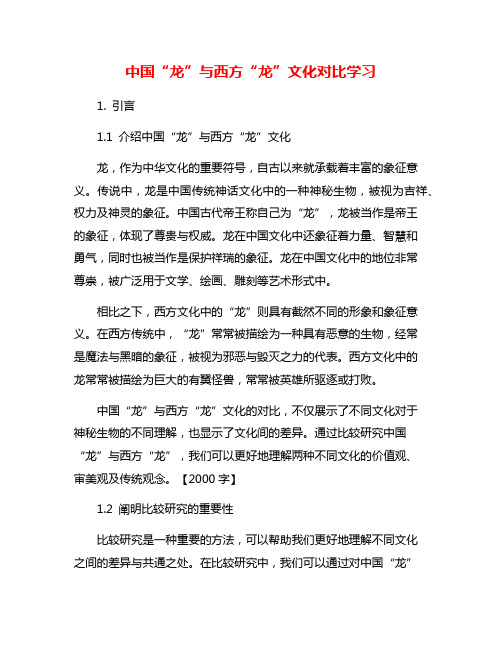中西方文化中动物象征意义的差异
解析动物在东西方文化中的差异和内涵

解析动物在东西方文化中得差异与内涵由于英汉两民族长期生活在不同得文化背景中, 自然而然地对同一动物词产生不同得联想, 赋予动物词以更丰富得文化内涵、下面从传统文化差异、审美价值取向两方面分析英汉同一动物词得文化内涵差异。
龙(dragon)就是中西方文化神话传说中得动物。
中文里吉祥尊贵得“龙”与英文中邪恶凶残得dragon 形成了鲜明得对比。
在中国文化中,龙象征着吉祥、权威、高贵与繁荣。
中华民族就是“龙得传人”。
在封建社会,龙就是帝王得象征, 历代皇帝都把自己称为“真龙天子”、时至今日, 龙在中国人民心中仍就是至高无上得, 我们把自己得国家称作“东方巨龙”,龙可以瞧作就是中华民族得图腾。
汉语中有大量得关于龙得成语, 诸如龙腾虎跃, 龙飞凤舞,都展现了龙在汉文化中得文化内涵。
然而在西方文化中, 人们却认为dragon 就是邪恶得代表, 就是一种狰狞得怪兽, 就是恶魔得化身。
中英文化得差异使同一动物词有不同得内涵, 给人带来得联想截然不同。
人们若想用英语表达汉语中得“龙”这一概念, 最好将其译成the Chinese dragon。
如“亚洲四小龙"可译成“Fourtigers”, 而不就是“Fourdragons", 以免引起误解。
蝙蝠(bat)1。
bat邪恶得bat与吉利得蝙蝠。
西方人一提起bat就害怕。
蝙蝠令人厌恶, 使人联想到丑陋与罪恶, 所以英语中凡带有bat 得习语都含有贬义, 如as blind as abat(有眼无珠) , bat 成了睁眼瞎得典型形象。
而在中国传统文化中, 蝙蝠因其中“蝠"字与“福”字同音, 摇身一变成了吉祥物、2。
bat在英语国家里,民间认为bat就是一种邪恶得动物,它总就是与罪恶与黑暗势力联系在一起、所以英语中凡带有bat得习语都含有贬义,如as blind asabat(有眼无珠), bat成了睁眼瞎得典型形象。
另外,英语中得bat还有“怪诞”、“失常”等含意,如,tohavebats in thebelfry“精神失常”,crazy as abat“神经错乱”。
中西方动物意义的区别

艺术作品中的动物象征意义
中国传统艺术中,鱼、鹤、蝴蝶等动物常被用作长寿、和谐、爱情的象征。 西方艺术中,狮子、鹰等动物常被用来象征力量、勇气和自由。
在现代艺术中,艺术家们经常运用动物形象来表达对环保、生态等议题的关注。
商务活动中的动物象征意义
在中国商务活动中,熊猫常被用作和平、友好的象征,也是国际交流的 重要使者。
鹰
鹰在中西方文化中都是勇敢、力量和自由的象征。在中国古代,鹰被赋予了勇猛 、奋进的寓意;而在西方文化中,鹰则常被用作国徽、军徽等标志,代表着国家 的荣耀和军事力量。
不同动物象征意义对比
蝙蝠
在中国文化中,蝙蝠因其“蝠”字与“福”字谐音而被视为吉祥、幸福的象征 ;而在西方文化中,蝙蝠则常被与黑暗、邪恶和吸血鬼等形象联系在一起。
阴阳和谐。
作为中国的国宝,熊猫 象征着和平、友谊和可
爱。
在中国文化中,鹤是长 寿、吉祥和高雅的象征。
研究目的与意义
了解不同文化背景下动物象征意义的 差异,有助于促进跨文化交流和理解。
对于文学、艺术、广告等领域,深入 了解动物象征意义有助于更准确地传 达信息和情感,增强作品的表现力和 感染力。
通过对比中西方动物象征意义,可以 揭示出各自文化中的价值观、信仰和 审美观念等方面的不同。
在希腊神话中,美杜莎的头发就 是一条条蠕动的毒蛇,代表着恐
怖和死亡。
其他动物象征意义
01
02
03
猫头鹰
智慧与学识的象征,在希 腊神话中,猫头鹰是智慧 女神雅典娜的使者。
鸽子
和平与纯洁的象征,常被 用于宗教仪式和国际和平 活动中。
羊
温顺与善良的象征,在基 督教文化中,羊也代表着 信徒和上帝的子民。
03 中国文化中动物象征意义
解析动物在东西方文化中的差异和内涵

解析动物在东西方文化中的差异与内涵由于英汉两民族长期生活在不同的文化背景中,自然而然地对同一动物词产生不同的联想,赋予动物词以更丰富的文化内涵。
下面从传统文化差异、审美价值取向两方面分析英汉同一动物词的文化内涵差异。
龙(dragon)是中西方文化神话传说中的动物。
中文里吉祥尊贵的“龙”与英文中邪恶凶残的dragon形成了鲜明的对比。
在中国文化中,龙象征着吉祥、权威、高贵和繁荣。
中华民族是“龙的传人”。
在封建社会,龙是帝王的象征,历代皇帝都把自己称为“真龙天子”。
时至今日,龙在中国人民心中仍是至高无上的,我们把自己的国家称作“东方巨龙”,龙可以看作是中华民族的图腾。
汉语中有大量的关于龙的成语,诸如龙腾虎跃,龙飞凤舞,都展现了龙在汉文化中的文化内涵。
然而在西方文化中,人们却认为dragon是邪恶的代表,是一种狰狞的怪兽,是恶魔的化身。
中英文化的差异使同一动物词有不同的内涵,给人带来的联想截然不同。
人们若想用英语表达汉语中的“龙”这一概念,最好将其译成the Chinese dragon。
如“亚洲四小龙”可译成“Four tigers”,而不是“Four dragons”,以免引起误解。
蝙蝠(bat)1. bat邪恶的bat与吉利的蝙蝠。
西方人一提起bat就害怕。
蝙蝠令人厌恶,使人联想到丑陋与罪恶,所以英语中凡带有bat的习语都含有贬义,1如as blind as a bat (有眼无珠) , bat成了睁眼瞎的典型形象。
而在中国传统文化中,蝙蝠因其中“蝠”字与“福”字同音,摇身一变成了吉祥物。
2. bat在英语国家里,民间认为bat是一种邪恶的动物,它总是与罪恶和黑暗势力联系在一起。
所以英语中凡带有bat的习语都含有贬义,如asblind as a bat (有眼无珠),bat成了睁眼瞎的典型形象。
另外,英语中的bat还有“怪诞”、“失常”等含意,如,to have bats in the belfry“精神失常”,crazy as a bat“神经错乱”。
中西方动物文化内涵对比

THANKS
感谢观看
狮子与骑士精神的关联
在欧洲中世纪,狮子被视为骑士精神的象征,代表着勇敢、忠诚和 骑士的荣誉。
中西方狮子文化对比分析
文化背景差异
中国狮子文化源于佛教,而西方 狮子文化则更多与基督教、罗马
文化和骑士精神相关。
艺术表现形式不同
中国石狮子的形象更加注重细节和 工艺,而西方狮子的形象则更加注 重气势和力量。
04
中西方动物文化内涵的差异反映了不同文化背景下人们的世界观、价 值观和审美观的差异。
对未来的展望
随着全球化的推进,中西方动物文化内 涵的交流与融合将更加频繁和深入。
未来研究中可以进一步探讨中西方动物 文化内涵的共性和差异,以及这些差异
对跨文化交流的影响。
可以通过加强中西方文化交流,促进双 方对彼此动物文化内涵的理解和认同,
“中庸之道”。
历史渊源
中国鹤文化源远流长,可以追溯 到古代的传说和神话,如《山海
经》中的仙鹤传说。
西方鹤文化
象征意义
01
在西方文化中,鹤象征着纯洁、优雅和永生,常被用于宗教、
神话和文学中。
文化内涵
02
在西方文化中,鹤被视为神圣的动物,与天使和神灵有着密切
的联系,也常被用来比喻高尚的品德和情操。
历史渊源
通过对比中西方龙文化,可以深入了解两种文化的价值观、信仰 和世界观等方面的差异,有助于促进跨文化交流和理解。
03
中西方狮子文化对比
中国狮子文化
狮子象征勇猛和力量
狮子与佛教的关联
在中国传统文化中,狮子常被视为勇 猛和力量的象征,代表着勇往直前、 不畏艰险的精神。
狮子在佛教中也有着特殊地位,被视 为佛的象征,代表着神圣和崇高。
中外文化对比之狗

西方狗在生活中的地位和待遇
工作伙伴
在西方国家,狗不仅被视为宠物, 还经常被用作工作伙伴,如警犬、 导盲犬、搜救犬等。
训练与活动
西方国家有许多针对狗的培训课 程和活动,如狗狗瑜伽、狗冲浪 等,以满足狗和主人之间的互动 需求。
社会福利
在西方国家,狗也享有较为完善 的社会福利,如动物保护组织、 收容所等。
04
中外狗与人类的关系
中外狗与人类的关系
1. 知觉袭和视觉加工 Theo处理加工,在
05
中外狗的品种和特点
中国狗的品种和特点
中华田园犬
中国本土的犬种,适应 性强,忠诚度高,常见
于农村和城市周边。
北京犬
原产于中国北京,性格 温和,聪明可爱,是中
国的传统玩赏犬。
拉萨犬
松狮犬
原产于中国西藏,性格 勇敢、忠诚,对主人极
中西狗在生活待遇上的比较
情感联系
角色差异
文化差异
在中国和西方国家,狗都被视为人类 的忠实伙伴,与人类有着深厚的情感 联系。
在中国,狗更多地被视为家庭宠物和 生活伴侣;而在西方国家,狗更多地 被用作工作伙伴或治疗犬等特殊角色。
ቤተ መጻሕፍቲ ባይዱ
由于文化差异,中国和西方国家在对 待狗的态度和方式上也有所不同。例 如,在中国,狗肉是一种传统食品, 而在西方国家,食用狗肉则被普遍认 为是不道德和不人道的。
忠实朋友
在中国,狗也被视为人类的朋友,是人类忠实的 伙伴,陪伴人们度过时光。
西方狗的象征意义
1 2
友谊与忠诚
在西方文化中,狗也被视为友谊和忠诚的象征, 狗对主人的忠诚度极高,是主人最好的朋友之一。
家庭成员
在西方家庭中,狗通常被视为家庭的一员,与家 人共同生活,共同分享家庭的欢乐与悲伤。
中西动物寓意比较

结语
语言是文化的载体,是文化的组成部分,而不同民 族文化又各不相同。这种文化差异也必然会反映到语 言运用的各个方面。本文通过对中英两种语言中的动 物习语的分析和比较,阐明了不同社会经济文化背景在 语言上的特色。在英语学习中,只有掌握习语,了解 它们所负载的民族文化信息,站在对方民族的文化背景 里去解读他们的民族语言,才不会望文生义,才可以顺 利的并且更加流畅的进行交流沟通。
我们再以英汉两个民族中对“虎”、“狮”的不 同联想为例。在中国人的文化意识中,“虎”是威武勇猛 的象征。因此,汉语有许多描述“虎”的这种形象的习 语。如:“虎虎生威”、“藏龙卧虎”、“虎背熊腰”, 甚至,“虎”被称为动物之王。在英语中,虎的位置被狮 子所代替,因为,在英国人的文化意识中狮子才是动物之 王,才是勇猛的象征。所以,汉语的“虎口拔牙”、“狐 假虎威”和“拦路虎”在英语分别被表达成以“狮”为 比喻体的“bear the lion”、“like a donkey in a lion’s skin”和“a lion in the way” 。
中国古代是农耕社会,人们的主要劳动工具是牛。牛辛辛苦 苦、日复一日地辛勤耕作,因此,在中国人的文化意识中牛是一种 力大无比、性格较倔、任劳任怨、敢于奉献的形象。 而在英国人的文化意识中,马是一种具有力量和速度的动物。 自古以来,英国人打仗、运输和体育运动都离不它。在英国,在中 世纪,马便是皇家饲养,御用的动物。在汉语中一些以牛为喻体的 习语到了英语多数被马所代替。 下面是一些汉语与英语习语的互译: 力大如牛 as strong as a horse 强得像头牛 as stubborn as a mule 老黄牛 work like a horse 吹牛 talk horse 牛饮 drink like a fish 牛不喝水强按头 you may take a horse to the water ,but you can’t make him drin
中国“龙”与西方“龙”文化对比学习

中国“龙”与西方“龙”文化对比学习“龙”是中国传统文化中的重要符号和象征,它被视为中国人民的象征和灵物,同时在中国古代传说中也扮演着重要的角色。
而在西方文化中,同样也存在着对龙的久远崇拜和神秘。
本文将从各个角度比较分析中国“龙”与西方“龙”文化的异同点。
一、历史渊源中国的“龙”文化最早可以追溯到商代的古文字中,而西方的“龙”文化则可以追溯到古代埃及。
在中国,人们相信“龙”是一种上古生物,具有神秘的力量和神秘的能力,是掌握自然规律和人类命运的神灵。
在西方,龙是一种凶恶的怪物,经常出现在古希腊和古罗马的神话传说中,与中国的“龙”传统文化有着很大的差异。
二、形象特征在中国传统文化中,龙被描述为一种长身蛇尾、龙角凤眼、麒麟须獐足、五彩斑斓的神兽,是中华民族的象征。
在西方文化中,龙被描述为一种巨大的爬行动物,通常有翅膀和长长的尾巴,被描绘为一种有着尖牙和利爪的恶龙。
三、含义解读中国的“龙”文化一直被视为吉祥的象征,它代表着权力、富贵和吉祥的象征,被赋予了崇高的地位。
在中国民间传说中,龙是大自然的主宰,也是带来雨水的神,因此被人们尊崇为神明。
而在西方文化中,龙被视为邪恶力量的象征,经常代表着灾祸和毁灭。
四、文化传承中国的“龙”文化一直被传承至今,无论是在书法、绘画、雕塑、戏曲还是舞蹈中,龙都扮演着不可或缺的角色,成为中国传统文化的重要元素。
而在西方文化中,龙文化也深深植根于西方人民的心中,被运用于建筑、绘画、文学等方面。
五、宗教意义在中国传统宗教中,龙经常被视为神灵和主神,被供奉和祈祷。
而在西方文化中,龙则被视为一种邪恶的生物,被用于宗教故事中的反派角色,代表着邪恶和毁灭的力量。
六、象征意义七、神话故事中国传统文化中,有很多关于龙的神话故事,如《白蛇传》、《龙潭虎穴》等等,这些故事都和中国的历史、文化和宗教有着密切的联系。
而在西方文化中,也有许多关于龙的神话故事,如《圣乔治与龙》、《贝奥武夫》等,这些故事都讲述了西方人民对于龙的神秘崇拜和传说。
动物的形象与代表含义在中西文化中的差异

the differences of the animal symbols between westerncountries and China(动物的形象与代表含义在中西文化中的差异)摘要:动物常常被我们富裕了一定的象征意义,带着我们的主观感受。
但是由于文化差异的存在,不同的民族对不同动物所象征的内涵和意义的是不同的,我们要从不同角度了解动物在中西方也就是汉语和英语中的象征意义,从而更好地了解各民族文化的差异,避免跨文化交际障碍。
关键词:动物形象the images animal stand for;谚语俗语saying;中西方文化the culture of China and the west;差异differences一、引言动物在人类生活当中是不可或缺的, 人类的语言都会涉及到动物名称, 中文和英文当然也不例外。
随着人类社会的发展,动物名开始慢慢地被赋予了从未有过的文化内涵。
但是由于中西方国家在历史、文化以及生活环境上的差异,部分动物名称被赋予的内在含义也不尽相同。
例如,有些动物在中文被赋予了褒义,但在英文中却是贬义的,反之亦然。
而这种差异性可以很好地体现在语言中,动物经常会出现在不同语言的谚语和习语中出现。
动物的象征意义在每个民族的日常用语中有丰富的体现。
在语言的翻译过程中,有的可以直译,有的却需要用不同的动物代替,其实将常见的动物翻译分为三类来:一类是可以直译且意义相同,一类是可以直译但意义不同,还有一类是翻译的同屋就不同。
而我要讲的重点侧重于后两者也就是中西方动物形象的差异。
二、中西方动物形象对比例证想要了解具体的动物形象与其代表的含义在中西方的差异,我会从大量的俗语或语言习惯入手,因为这种差异性可以很好地体现在语言中,例如谚语和习语。
(一)狗狗dog一词在英美文化中常作褒义词, 是人类最好的朋友。
而这个观点在西方体现的淋漓尽致。
英国人大都对狗有好感,视其为掌上明珠,呵护有加。
由于西方人对狗的好感, 英语中有许多关于狗的习语,除了少数受外来文化影响含有贬义外,大部分都是积极的意义。
从中西方对动物词汇喻意的不同理解看中西方文化差异

从中西方对动物词汇喻意的不同理解看中西方文化差异发表时间:2013-07-12T08:31:37.153Z 来源:《教育艺术》2013年第4期供稿作者:杨义花[导读] 然而,由于民族文化、地域文化、历史文化、宗教文化的不同,在英汉语文化中许多动物词汇的喻义又是截然不同的。
杨义花河北省沧州教育局石油分局井下学校061000 由于英汉两民族长期生活在不同的文化背景中,所以他们对同一动物会产生不同的联想,并赋予动物以丰富的文化内涵。
汉、英这两种语言中都有大量的以动物为喻体的词汇,如果在交际中缺乏有关词语在目的语中的文化意义的了解,就会引起误解或导致交流的失败。
因此无论学习何种语言都必须注意这些带有民族文化背景色彩的词汇,逐步掌握它们的喻意,进一步熟悉其文化内涵。
只有这样,才能真正通晓语言,实现无障碍的交际。
下面是我对中英文当中出现的具有文化内涵的动物名进行归类,便于大家的学习和应用。
一、中英文中相同内涵的动物名称驴(donkey):驴在中英文中都被认为是不讨人喜爱的动物。
在英文中如果要说某人愚蠢或固执就会说“he is an absolute donkey”。
中文相同的表达方法是“他倔得像头驴,蠢驴”。
狐狸(fox):在中英文的寓言故事中狐狸的形象总是奸诈狡猾的。
在中文中经常提到“一只狡猾的狐狸”,在英文中会说“a cunning fox”。
鹦鹉(parrot):中西方国家的人都认为鹦鹉能够代表那些只会模仿别人而没有自己见解的人,因此英文中的短语“talk like a parrot”对应于中文的“鹦鹉学舌”。
在纷繁复杂的语言中还有很多动物在中英文中具有相同的内涵。
如,百灵(lark)可以指代高兴的人,绵羊(sheep)指代胆小怯懦的人。
以上所述的动物在中英文中具有相同的含义,其原因大致可以分为两个:第一,中西方人们的生活环境存在着相似之处,人们通过在实际生活当中的观察,总结了相似的动物天性,从而自然而然地对这些动物赋予了对应的含义,如在上文中提到的狐狸(fox)、蛇(snake)、驴(donkey)等等;第二,随着中西方国家的交流日益增加、文化方面的相互渗透,就逐渐接纳了对方的观点。
中西动物文化意象区别

中英文化动物之别由于英汉两民族长期生活在不同的文化背景中, 自然而然地对同一动物词产生不同的联想, 赋予动物词以更丰富的文化内涵。
下面从传统文化差异、审美价值取向两方面分析英汉同一动物词的文化内涵差异。
龙(dragon) 是中西方文化神话传说中的动物。
中文里吉祥尊贵的“龙”与英文中邪恶凶残的dragon 形成了鲜明的对比。
在中国文化中, 龙象征着吉祥、权威、高贵和繁荣。
中华民族是“龙的传人”。
在封建社会, 龙是帝王的象征, 历代皇帝都把自己称为“真龙天子”。
时至今日, 龙在中国人民心中仍是至高无上的, 我们把自己的国家称作“东方巨龙”, 龙可以看作是中华民族的图腾。
汉语中有大量的关于龙的成语, 诸如龙腾虎跃, 龙飞凤舞, 都展现了龙在汉文化中的文化内涵。
然而在西方文化中, 人们却认为dragon 是邪恶的代表, 是一种狰狞的怪兽, 是恶魔的化身。
中英文化的差异使同一动物词有不同的内涵, 给人带来的联想截然不同。
人们若想用英语表达汉语中的“龙”这一概念, 最好将其译成the Chinese dragon。
如“亚洲四小龙”可译成“Four tigers”, 而不是“Four dragons”, 以免引起误解。
审美价值取向和社会心理的差异审美价值取向和社会心理的差异的不同造成同一动物词在中英两种文化中产生不同的褒贬义, 这与英汉两个民族对动物的好恶有关。
对该动物喜欢、欣赏, 那相对应的动物词就会向褒义方向发展。
反之, 就会向贬义方向发展。
(1) 同一动物词在汉英两种语言中褒贬意义截然不同。
同一动物词在英语中表示褒义, 在汉语中却表示贬义, 如狗 (dog)、猫头鹰(owl)、熊 (bear)。
与人友善的dog 和令人厌恶的狗。
在英汉语言中狗的基本意义是一致的, 都表示家养的, 有四条腿, 可帮人看家护院的一种动物。
但其文化内涵意义却差异甚大。
狗在英语中大多数场合是褒义词, 可用来形容值得同情信赖的人, 如help a dog over a still (助人度过难关) , a lucky dog (幸运儿) , an old dog (老手) , love me, love my dog (爱屋及乌)。
中西方动物寓意的差异

中西方动物寓意的差异主要体现在以下几个方面:
1. 龙:在中国文化中,龙是吉祥、高贵、神圣的象征,而在西方文化中,龙常常被描绘为邪恶、凶残的生物。
这种差异可能是由于中西文化对于龙的认知和想象不同所导致的。
2. 狗:在西方文化中,狗被视为人类最忠实的朋友,常常与忠诚、友爱等积极情感联系在一起。
而在中国文化中,狗有时会被赋予贬义,如“狗仗人势”、“狗腿子”等表达。
这可能是由于中西文化对于狗的角色和地位认知不同所导致的。
3. 熊:在中国文化中,熊常常被赋予勇猛、力量的象征意义,而在西方文化中,熊则更多地被描绘为可爱、憨厚的形象。
这种差异可能是由于中西文化对于熊的描绘和想象不同所导致的。
4. 狐狸:在中西方文化中,狐狸都具有狡猾、奸诈的象征意义,但在中国文化中,狐狸还有神秘、灵性的意味,如“狐狸精”等形象。
这种差异可能是由于中西文化对于狐狸的认知和想象有所重叠但也有所区别所导致的。
总的来说,中西方动物寓意的差异源于中西文化的差异,这些差异反映了不同文化对于动物的认知和想象的不同方式和角度。
在跨文化交流中,了解和理解这些差异有助于更好地沟通和理解彼此的文化和价值观。
动物在中西方文化中的差异

动物在中西方文化中的差异1. 引言大家好,今天我们来聊聊动物在中西方文化中的那些事儿。
动物不仅是我们的朋友,还是文化中的重要角色。
不同的文化对同一种动物往往有截然不同的理解和象征意义,简直就像两种不同的语言一样,听起来既搞笑又让人深思。
2. 中国文化中的动物2.1 吉祥的象征在中国,很多动物都被视为吉祥的象征,比如龙。
这家伙可是皇权的象征,威风凛凛,大家都得给面子。
再看看虎,人人都知道“虎虎生威”,它的形象可是强壮和勇敢的代名词,常常被用来形容那些不怕困难的人。
还有猴子,大家常说“猴年大吉”,这个小家伙在传统文化中可是聪明和灵活的代表。
2.2 饮食文化中的动物而在饮食文化中,动物的角色也很重要,比如猪。
嘿,谁说猪不能飞?在中国,猪是富裕和繁荣的象征。
每到过年,大家都会准备一桌丰盛的菜肴,当然少不了那香喷喷的猪肉。
而且,鸡也是重要的一员,尤其是“鸡年”里,人人都希望能“金鸡报晓”,迎来好运。
3. 西方文化中的动物3.1 动物的多样性相比之下,西方文化中对动物的理解就更为多样了。
例如,鹰在美国文化中可是个大明星,它象征着自由和勇气,大家都爱用它来形容英雄和奋斗的精神。
而猫呢?在西方,猫常常被当成神秘和优雅的代表,尤其是黑猫,更是常常出现在万圣节,给人一种“不可思议”的感觉。
3.2 动物与人类关系此外,西方人对宠物的热爱也是无与伦比的,尤其是狗,被誉为“人类最好的朋友”。
无论是大狗还是小狗,大家都愿意把它们当成家庭的一员。
而且,西方很多文化中还有“动物权利”的理念,提倡尊重和保护动物,呼吁大家不要随便伤害它们。
4. 文化碰撞与融合中西方文化的差异不仅体现在动物的象征意义上,还在于人们的态度和行为。
有时候,动物在一个地方被视为吉祥的象征,而在另一个地方却可能成为猎物。
这种文化碰撞让人不禁捧腹大笑,同时也让人反思:我们是否该以更开放的心态去理解和接受不同文化中的动物角色?5. 结论总之,动物在中西方文化中承担着不同的角色,它们的意义和象征不仅丰富了我们的文化认知,还让我们感受到文化的多样性与深度。
中国“龙”与西方“龙”文化对比学习

中国“龙”与西方“龙”文化对比学习1. 引言1.1 介绍中国“龙”与西方“龙”文化龙,作为中华文化的重要符号,自古以来就承载着丰富的象征意义。
传说中,龙是中国传统神话文化中的一种神秘生物,被视为吉祥、权力及神灵的象征。
中国古代帝王称自己为“龙”,龙被当作是帝王的象征,体现了尊贵与权威。
龙在中国文化中还象征着力量、智慧和勇气,同时也被当作是保护祥瑞的象征。
龙在中国文化中的地位非常尊崇,被广泛用于文学、绘画、雕刻等艺术形式中。
相比之下,西方文化中的“龙”则具有截然不同的形象和象征意义。
在西方传统中,“龙”常常被描绘为一种具有恶意的生物,经常是魔法与黑暗的象征,被视为邪恶与毁灭之力的代表。
西方文化中的龙常常被描绘为巨大的有翼怪兽,常常被英雄所驱逐或打败。
中国“龙”与西方“龙”文化的对比,不仅展示了不同文化对于神秘生物的不同理解,也显示了文化间的差异。
通过比较研究中国“龙”与西方“龙”,我们可以更好地理解两种不同文化的价值观、审美观及传统观念。
【2000字】1.2 阐明比较研究的重要性比较研究是一种重要的方法,可以帮助我们更好地理解不同文化之间的差异与共通之处。
在比较研究中,我们可以通过对中国“龙”与西方“龙”文化的对比分析,认识到不同文化对同一符号的理解和表达方式的差异,进而揭示出不同文化背景下的思维模式和审美观念。
通过比较研究,我们可以拓展我们的视野,增进我们对世界多元文化的理解和认识,促进不同文化之间的交流与融合。
比较研究也可以帮助我们更好地保护和传承自己的文化遗产,促进文化的创新与发展。
比较研究对于我们深入探究中国“龙”与西方“龙”文化的差异与共通之处,以及对中西方文化交流与融合的影响具有重要意义。
通过比较研究,我们可以更好地理解和珍惜中国“龙”与西方“龙”这一共同的文化遗产,推动不同文化间的相互尊重与合作,促进文明的共同进步。
2. 正文2.1 中国“龙”的起源与象征意义中国“龙”的起源可以追溯到上古时期。
动物词的文化含义比较与翻译

动物词的文化含义比较与翻译
动物词在不同的文化中可能具有不同的含义和象征意义。
以下是一些常见动物词的文化比较和中文翻译:
1. 狮子(Lion):
-西方文化:力量、威严、勇气、王者之象征。
-中国文化:威武、尊贵、权力、国家的象征。
2. 马(Horse):
-西方文化:自由、快速、力量、荣耀。
-中国文化:忠诚、勇敢、吉祥、进取。
3. 龙(Dragon):
-西方文化:恶龙代表邪恶和毁灭,但也可能象征勇气和英雄主义。
-中国文化:贵族、吉祥、权力、天的象征。
4. 猫(Cat):
-西方文化:独立、神秘、灵活、幸运。
-中国文化:灵巧、敏捷、善变、魅力。
5. 蛇(Snake):
-西方文化:欺诈、诱惑、邪恶,但也可能象征睿智和转变。
-中国文化:智慧、灵敏、富有神秘色彩、健康和寿命的象征。
需要注意的是,动物词的文化含义可能因文化背景、宗教信仰、传统习俗等而有所不同。
在进行翻译时,应根据具体语境和目标读者的文化背景,选择合适的译词来传达动物词的文化含义。
中西方对动物文化差异

范冰冰穿仙鹤装
• 范冰冰这身衣服的 选择肯定是站在展 示中国文化的立场 上,是带有美好而 深刻的寓意的,相 信对中国文化稍有 了解的法国朋友也 不会有所误解。 但是仍被一些法国 记者说范冰冰like a bitch。
5.狮子(lion)
中:人们对狮子一般没 有那么多的联想 。 他们认为老虎才是 百兽之王。
3.龙(dragon)
• 中:龙象征着吉祥(lucky)、权威
(authoritative)、高贵(noble)和繁荣 (prosperous) 。汉语中有大量的关于龙的 成语, 如龙腾虎跃, 龙飞凤舞, 都展现了龙在 汉文化中的文化内涵。 • We are the descendents of dragon. 我们是龙的传人。 Chinese people have the spirit of dragon. 中国人民拥有龙的精神。 ……
10.羊(sheep或goat)
• 中:中国人心中的羊, 是温顺、听话的动物, 所以有“五羊”牌自 行车。但将该商标翻 译成英语要避免使用 goat,因为goat隐含 着“色鬼”、“牺牲 品”的意思。
• 西:人们更喜欢绵羊(sheep),而不喜欢山羊(goat),因 为绵羊比较温顺,山羊好斗,雄性山羊的尾部发出臭味, 令人厌恶。因此,英国人用sheep比作好人,用goat比 作坏人。 • sheep and goats 善人与恶人(来自《圣经》) • a wolf in sheep‘s clothing披着羊皮的狼, 口蜜腹剑 的人 • a sheep among wolves落在一群恶汉手中的善良人 • a black sheep害群之马; 拒绝参加罢工的工人 • a lost sheep迷途羔羊, 迷失正道的人 • return to one‘s sheep回到本题 • follow like a sheep盲从 • as well be hanged for a sheep as for a lamb [谚]偷 大羊或偷小羊反正都得挨绞刑; 一不做二不休
浅谈动物名称在中西方文化中的内涵差异

浅谈动物名称在中西方文化中的内涵差异浅谈动物名称在中西方文化中的内涵差异一、中英两种语言中动物文化的差异动物与人类共同生活在这个地球上,朝夕相处,密不可分。
人类通过与动物的长期接触,逐渐了解了各种动物的天性和生活习性,并把与动物的感情反映在自己的语言中。
然而,不同的语言和文化对同一种动物的理解和情感却有着很大的差异,下面以英汉两种语言中对几种动物的不同理解为例。
1、龙对中国人来说是非常重要的动物之一。
它象征着君王,体现着权利,在人们心中是最神圣的。
因此自古以来皇帝穿的是龙袍,祝福自己的孩子成功就叫“望子成龙”,中国人称自己为“龙的传人”等等,这些词都是褒义词。
相反,在西方国家,人们普遍认为dragon是一种凶残的动物,是邪恶的象征,因此大多数都做贬义词来使用,比如“凶悍的女人”就是a dragon of woman。
而在英语文学作品中,龙又象征着邪恶凶险,在圣经中,把Satan比作是“the great dragon”。
2、“老虎”一词在汉语语言文化中一直是英勇威武的象征,因此我们常说“卧虎藏龙”“虎将”等,然而在英美文化中,常常用狮子lion一词来表示勇猛,成为百兽之王,英国甚至将狮子当作国家的象征,“British Lion”是英国的别称。
3、猫头鹰在汉语文化中被看作是不祥的征兆,尤其是害怕看到或者听到猫头鹰的叫声。
然而,在西方社会中,owl(猫头鹰)却象征着智慧。
在婴幼儿的故事中,owl的形象是个裁判,非常严肃,并且有头脑。
二、动物文化差异产生的原因1、历史条件不同的原因以“狗”为例,西方尤其是美国最早以渔猎、畜牧为主,主要食用牛羊,狗在当时是人类的帮手,所以西方将“狗”看成人类最忠实的朋友。
而中国自古是一个农业国,狗不仅仅是帮人看家防盗,还是人们的主要肉食之一,所以国内的大部分地方至今仍保持了吃狗肉的习惯。
2、地域文化不同的原因不同的生活环境中有属于自己不同的文明体系,属于黄土文明的中国和属于海洋文明的英国形成了各具特色的地域文化,而正是由于这种文化的不同,使中英两个民族对有些动物赋予了各自不同的文化内涵和寓意。
- 1、下载文档前请自行甄别文档内容的完整性,平台不提供额外的编辑、内容补充、找答案等附加服务。
- 2、"仅部分预览"的文档,不可在线预览部分如存在完整性等问题,可反馈申请退款(可完整预览的文档不适用该条件!)。
- 3、如文档侵犯您的权益,请联系客服反馈,我们会尽快为您处理(人工客服工作时间:9:00-18:30)。
A same word in two languages expresses a same meaning
To both Chinese and western people, some animals contain similar connotations,
“parrot” (鹦鹉),the animal which can simulate human voice, refers to a man who repeats the words of others without his own opinions in both the languages;
In the long course of human history, animals keep a close relationship with our human being and have a deep effect on human living and growth. This relationship brings people all kinds of complicated emotion such as love, sympathy, disgust and fear. Moreover, people also often repose their mood on animals to express their feeling. Owing to the differences of geographical environments and customs, these words and phrases, whose denotations are similar in the two languages, have different cultural backgrounds in English and Chinese languages, consequently their cultural connotations will be different from each other. This PPT will mainly contrast the divergences of cultural connotations for animal words to explain the cultural differences between Chinese and English.
Significance of contrast of animal words between English and Chinese
1.Learning about the cultural differences between English and Chinese appearing in animal words can help people understand the emotional meaning of language and the two cultures further and remove the barriers in intercultural communications; therefore it is of great value in practice. 2.Knowing about the connotations or associations of an animal word in one language can keep us away from heavy losses in commercial activities owing to cultural differences between the two languages such as naming a product. 3.To learn about the cultural background of a word is good for selecting a right word for expression. To an English learner, making a good understanding of both the native language and the foreign language is a good way to have a good command of the language.
“bee”(蜜蜂) in both English and Chinese stands for busy and hardworking people, for instance the phrase “as busy as a bee”(像蜜蜂一样忙碌); and “jackal”(胡狼,豺) means greedy, contemptible. Animal images of these words in English and Chinese cultures are identical on the whole.
The same cultural connotation of different animal words
That is to say, different animal words can express a same or similar meaning. Although the animal word people use in one language is different from that used in the other one, they are similar in figure of speech Just because of the common characters of human culture, people, whatever Chinese or English, have some sameness in mind to this objective reality. Therefore, people speaking different languages in different countries can exchange their mind freely to foreigners in cross-culture communication.
Wolves (狼) are all bloodthirsty and cruel, so in the two languages there are similar expressions such as
“as cruel as a wolf”(像狼一样凶残), “a wolf in sheep’s clothing”(披着羊皮的狼)
Content Else
a snake in the grass like a cat on hot bricks Lion –hearted Get sb’s goat Separate the sheep from the goats top dog cat and dog life A cat may look like a king
“as hungry as a wolf”(饿得像狼).
In English “wolf” has a slang meaning, saying that it refers to man who seduces women, and likewise in Chinese people have the word “色狼”;both of them developed from “greedy”(贪婪) which is an attendant meaning of “wolf”. English people usually describe that a person is “wolfing down his food”, and in Chinese people use wolf(狼) too. In Chinese it is said “狼 吞虎咽”.
Another similar example is the “cry wolf” and the story of “狼来 了”,both of the two means telling lies. If a foreigner comments a politician like this: “that politician cries wolf in every speech he makes”, he is surely saying that “那个政治家在他的每篇演说中都说了假话”.
The similarities
A same word expresses a same meaning
The same connotation of different animal
The correspondence of adopted words
In whatever English or Chinese, lots of words, phrases or idioms are connected to animals. They are so lively and vivid that people can have a direct impression in mind, and then connect the images to the internal connotations. Because of the culture communications between east and west and the similarity of thinking manners, an animal word would have same or similar connotations.
The vocabulary in different languages can reflect the developments of different languages. There are many expressions connected with animals in both English and Chinese because of history, customs, value and religion beliefs. This PPT analyzes the differences between the English and Chinese expressions connected with animals, vividly showing the cultural influence on vocabulary and the differences between the Chinese and English culture. And it will be helpful for English learners’ intercultural communication.
